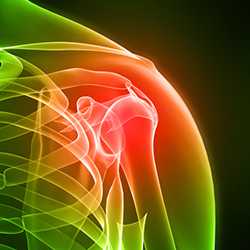
Your shoulder is made up of several bones, muscles, and tendons. Its main function is to give your arm a wide-range of motion. Unfortunately, the near constant movement in the joint can lead to injuries.
Most shoulder problems fall into four major categories:
- Tendon inflammation and tears
- Instability
- Arthritis
- Fracture (broken bone)
Tendon Inflammation and Tears
Tendon inflammation and tears can be caused by a sudden injury, but are usually caused by repetitive motions. Certain sports like golf and tennis or activities like painting can lead to the following shoulder injuries.
- Tendonitis happens when the tendon, or tissue that attaches muscle to bone, is inflamed, irritated and/or swollen.
- Bursitis is the inflammation of a bursa. Bursa are small fluid-filled sacs located in your joints. They act as cushions between bones and overlying soft tissues and help to reduce friction between gliding muscles and bone.
- Impingement occurs when bone rubs directly on the tendon, causing the tendon to weaken or tear. This is often brought on by inflammation that gives less space for the tendons and muscles to move within the joint.
- Rotator cuff tears are commonly caused by overuse and happen when the group of muscles and tendons that surround your shoulder joint and keep the head of your upper arm bone in your shoulder socket, split or tear. The size and length of tears vary.
Treatments
Treatment options may include:
- Resting your shoulder and avoiding activities or positions that cause pain
- Taking anti-inflammatory (non-steroid) medicine
- Receiving a cortisone injection to reduce inflammation and control pain
- Participating in physical therapy to stretch and strengthen the injured area
- Surgery may be needed if nonsurgical treatments are not enough
Instability
When the head of your upper arm bone is forced partially out of your shoulder socket by overuse or injury, you are experiencing shoulder instability. It may feel like a “slipping” or “catching” sensation in your shoulder. If the bone comes completely out of the socket, it’s called dislocation, which is very painful. Unfortunately, once the ligaments, tendons, and muscles around your shoulder become loose or torn, you’re prone to repeated dislocations.
Treatments
Your arm bone needs to be put back into your shoulder socket by a doctor. Once repaired, you’ll likely wear a sling for a few weeks. For recurring dislocations, shoulder surgery may be required.
Arthritis
Arthritis is inflammation in your joint(s) that causes pain and stiffness. You have two shoulder joints that can be affected by arthritis. One joint is where your collarbone meets the tip of your shoulder blade. The other is where your upper arm bone fits into your shoulder blade. Arthritis can be caused by “wear-and-tear,” (osteoarthritis), an autoimmune disease (rheumatoid arthritis) or by a prior injury — including a broken bone, rotator cuff tear or shoulder dislocation.
Treatments
Treatment options may include:
- Resting your shoulder
- Doing range of motion exercises and/or physical therapy
- Taking anti-inflammatory (non-steroid) medicine
- Having joint replacement surgery
Fracture
Shoulder fractures (broken bones) commonly involve the clavicle (collarbone), humerus (upper arm bone), and scapula (shoulder blade). They lead to severe pain, swelling and bruising around the shoulder and are caused by a sudden injury, such as a fall or car accident.
Treatments
Often, you’ll need to wear a sling or “figure 8” strap for three to eight weeks. If it’s not a “clean break,” surgery may be necessary. Plates, screws or wires may need to be incorporated with surgery.
Emory Healthcare
Emory Orthopaedics & Spine Center‘s nationally recognized specialists treat all types of shoulder conditions and injuries. Schedule an appointment to see an Emory shoulder specialist today. Call 404-778-3350 or complete our online appointment request form.
